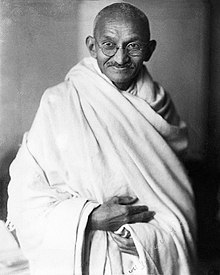Mohandas Karamchand Gandhi (2 October 1869 – 30 January 1948) was an Indian lawyer, anti-colonial nationalist, and political ethicist, who employed nonviolent resistance to lead the successful campaign for India's independence from British Rule, and in turn inspire movements for civil rights and freedom across the world. The honorific Mahātmā (Sanskrit: "great-souled", "venerable"), first applied to him in 1914 in South Africa, is now used throughout the world.
Born and raised in a Hindu family in coastal Gujarat, western India, Gandhi was trained in law at the Inner Temple, London, and called to the bar at age 22 in June 1891. After two uncertain years in India, where he was unable to start a successful law practice, he moved to South Africa in 1893 to represent an Indian merchant in a lawsuit. He went on to stay for 21 years. It was in South Africa that Gandhi raised a family, and first employed nonviolent resistance in a campaign for civil rights. In 1915, aged 45, he returned to India. He set about organising peasants, farmers, and urban labourers to protest against excessive land-tax and discrimination. Assuming leadership of the Indian National Congress in 1921, Gandhi led nationwide campaigns for easing poverty, expanding women's rights, building religious and ethnic amity, ending untouchability, and above all for achieving Swaraj or self-rule.
Independece Question on Mohandas Karamchand Gandhi
1.What is meant by the term 'Mahatma'?
Answer: Great Soul
2. What is the main implication of his philosophy? Answer: Means justify the ends
3. What is the full name of the Mahatma? Answer: Mohandas Karamchand Gandhi
4. What is the name of the Ashram that he set up? Answer: Sabarmati Ashram
Answer: Great Soul
2. What is the main implication of his philosophy? Answer: Means justify the ends
3. What is the full name of the Mahatma? Answer: Mohandas Karamchand Gandhi
4. What is the name of the Ashram that he set up? Answer: Sabarmati Ashram
5. What did Gandhi’s family want him to become? Answer: Dewan (Prime Minister)
6. Where did Gandhi go for his higher studies? Answer: London, England
7. What was the organization that was contemporarily fighting for India’s freedom? Answer: Indian National Congress
8. What was Gandhiji also called in Hindi which means Father? Answer: Bapu
9. Where was Gandhiji born ?
A) Porbander
10.Which is a part of his ideals which he religiously followed ?
A) Truth and Non-Violence
11. What is the meaning of Satyagraha ?
A) Force which is born of Truth
12. What was Gandhiji's wife's name?
A) Kasturba

No comments:
Post a Comment
Lets us know your feedback in commemts: